Canada says it will support UN indigenous rights declaration
Change Size
 Chief Bruce Shisheesh, left, Minister of Indigenous Affairs Carolyn Bennett, center, and Federal NDP MP Charlie Angus, right, meet in the northern Ontario First Nations reserve in Attawapiskat, Ontario, Canada, on Monday, April 18, 2016. Natan Obed, president of Inuit Tapiriit Kanatami, the leader of the country's national Inuit organization says his people are dealing with devastating rates of suicide. "I am thankful for the leadership of (NDP indigenous affairs critic) Charlie Angus in bringing the issue forward," Obed said in an interview with The Canadian Press. (The Canadian Press via AP/Nathan Denette)
Chief Bruce Shisheesh, left, Minister of Indigenous Affairs Carolyn Bennett, center, and Federal NDP MP Charlie Angus, right, meet in the northern Ontario First Nations reserve in Attawapiskat, Ontario, Canada, on Monday, April 18, 2016. Natan Obed, president of Inuit Tapiriit Kanatami, the leader of the country's national Inuit organization says his people are dealing with devastating rates of suicide. "I am thankful for the leadership of (NDP indigenous affairs critic) Charlie Angus in bringing the issue forward," Obed said in an interview with The Canadian Press. (The Canadian Press via AP/Nathan Denette)
C
anada said Monday it will support a UN declaration protecting the rights of more than 370 million native peoples worldwide, ending more than eight years of opposition to the historic document that affirms their equality.
Minister of Indigenous and Northern Affairs Carolyn Bennett told a UN news conference that Canada will officially remove its "permanent objector status" on Tuesday and become a full supporter of the Declaration on the Rights of Indigenous Peoples.
"It means a great deal in Canada but it means a great deal, I think, around the world that Canada is no longer a persistent objector, that we are fully adopting this and working to implement it within the laws of Canada," she said.
Canada, which has 1.4 million indigenous peoples, is the last of the four countries that opposed the declaration when it was adopted by the UN General Assembly in 2007 to sign on to it. All four argued it was incompatible with their existing laws, even though Canada helped draft it.
Australia reversed its opposition and supported the declaration in 2009 followed by New Zealand and the United States in 2010. Canada endorsed the declaration in 2010 but maintained a number of objections.
Supporting the UN declaration was part of the platform that Canada's Prime Minister Justin Trudeau ran on. Bennett and Justice Minister Jody Wilson-Raybould both stressed that after Trudeau's victory last October he ordered his Cabinet to rebuild the relationship with Canada's indigenous communities.
"No relationship is more important to me and to Canada than the one with indigenous peoples," Wilson-Raybould, who is the daughter of a hereditary chief from Western Canada and a former regional head of the British Columbia Assembly of First Nations, quoted Trudeau as saying in a speech to the opening session of the U.N. Permanent Forum on Indigenous Issues.
Wilson-Raybould, who is also Canada's attorney general, said "that for Indian, Inuit and Metis peoples we can and will breathe life into section 35 of Canada's Constitution, which recognizes and affirms existing Aboriginal and treaty rights, by embracing the principles or minimum standards articulated in the United Nations declaration."
The declaration, which is not legally binding, affirms the equality of indigenous peoples and their right to maintain their own institutions, cultures and spiritual traditions. It also establishes standards to combat discrimination and marginalization and eliminate human rights violations against them.
It calls on states to prevent or redress the forced migration of indigenous peoples, the seizure of their land or their forced integration into other cultures. It says "prior and informed consent" should be obtained from indigenous groups for the development of land and resources. It also grants indigenous groups control over their religious and cultural sites and the right to manage their own education systems, including teaching in their own languages.
Bennett said Canadians have learned from their Truth and Reconciliation Commission "that the legacy of colonization has been far-reaching" on its indigenous peoples. "So many Canadians were totally ignorant about this sordid chapter in our history," she said.
What supporting the UN declaration will do, Bennett said, is allow the government "to proceed with a conversation with Canadians" about how the document will be implemented.
Wilson-Raybould stressed that "reconciliation requires laws to change and policies to be rewritten."
"I don't think we're going to get to full reconciliation until every Canadian understands the harm that was done, and that only then can we come together in terms of a reconciliation," Bennett said. "I think that's the journey that we are on now in Canada — we are admitting that harm was done."









